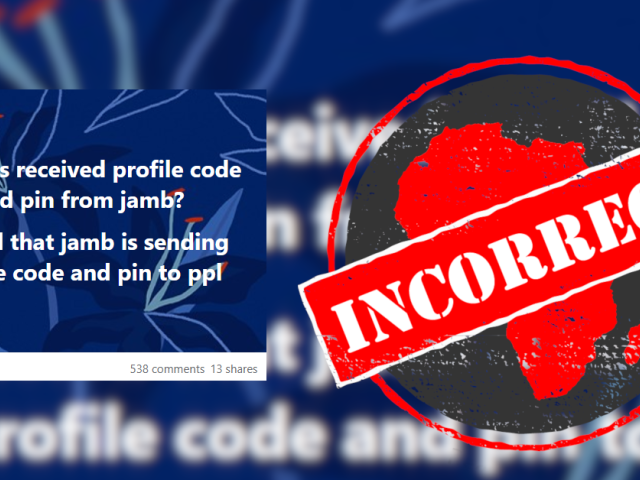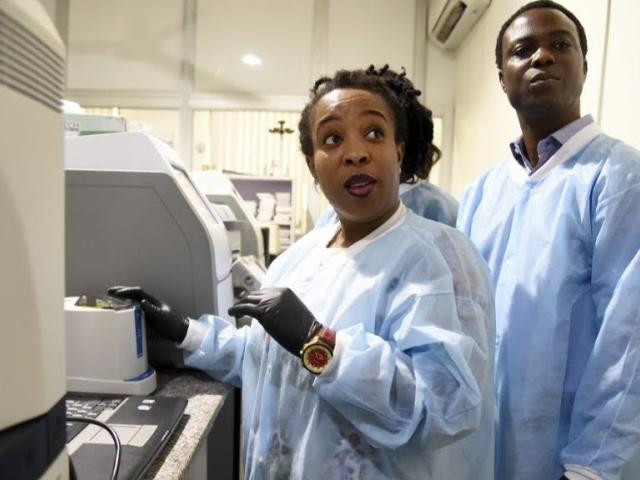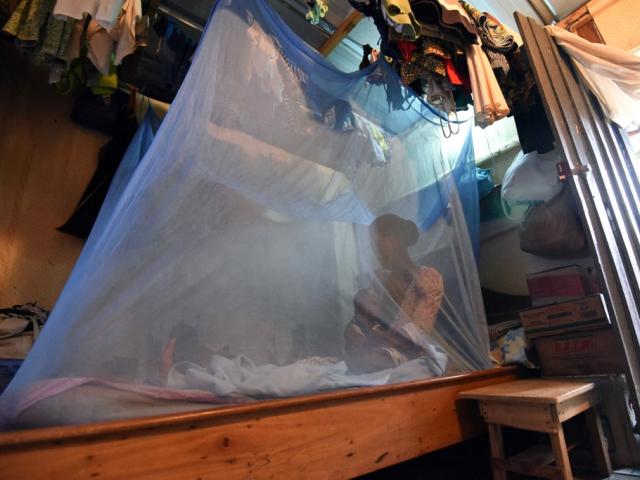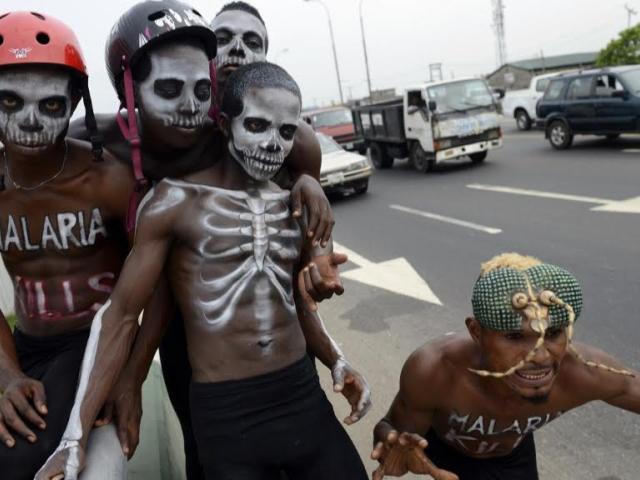In April 2023, Nigeria granted provisional approval for the R21/Matrix-M malaria vaccine, becoming the second country in the world to do so, after Ghana.
Developed by the University of Oxford, R21 is manufactured by the Serum Institute of India, the world’s largest vaccine manufacturer.
Nigeria’s National Agency for Food and Drug Administration and Control (Nafdac) said it had reviewed data received from the manufacturer in keeping with internationally agreed health standards.
The agency, which regulates foods and drugs in Nigeria, said that it had “concluded that the data on the R21 Malaria vaccine were robust and met criteria for efficacy, safety, and quality”.
It added that while it had in specific instances asked for more information, the clarifications sought “did not affect the overall adequacy” of the information it received.
Once this additional information had been provided, provisional approval would become “full approval”, Prof Mojisola Adeyeye, director general of Nafdac, told Africa Check.
The R21 vaccine has undergone clinical trials in the UK, Thailand and several African countries, but only Ghana and Nigeria have approved it for general use.
Nafdac also recommended that an additional clinical trial be done in Nigeria because the disease affects different population groups in the country differently.
“We are going to do phase 4 clinical trials, it should be tested in our country. We are going to do more observation. This would involve more laboratory work,” Adeyeye was reported as saying shortly after the approval was made public.
These in-country R21 trials are expected to “begin soon”, she added.
Phase 4 trials are conducted after a drug has been officially approved, to gather more long term information about a drug’s effectiveness and any side effects. You can read about the vaccine approval process in Nigeria here and in the US here.
Adeyeye told Africa Check that the vaccine “cannot be administered until it goes through a testing process in the country”. Only then would a “lot release certificate” be issued, including to the health ministry and to the pharmaceutical companies that would market the vaccine.
The WHO says lot release is the process of evaluating each individual lot of a licensed product before giving approval for its release onto the market.
This factsheet answers more questions about the vaccine in Nigeria.
What’s all the hype about malaria vaccines?
Because malaria is caused by a parasite, not a virus, developing a vaccine that is highly effective against a “ very complex disease” is “extremely difficult”.
The US Centers for Disease Control and Prevention (CDC) says development of a malaria vaccine has faced several obstacles, including the lack of a traditional market, few developers, and the technical complexity of developing any vaccine against a parasite.
Malaria vaccines have been in development since the 1960s, but it wasn’t until 2021 that the World Health Organization (WHO) approved the first one, RTS,S developed by pharmaceutical giant GlaxoSmithKline, for widespread use among children. This vaccine showed moderate efficacy (36% over four years).
R21 is the first vaccine (78% over two years) to exceed the WHO-specified target of 75% or higher efficacy, leading to descriptions of it as being “world-changing”.
Some local publications have estimated the cost of malaria to Africa’s largest and most populous economy at US$1.1 billion every year.
What is malaria?
Malaria is a life-threatening disease transmitted to humans through the bite of an infected female Anopheles mosquito. It affects people of all ages but most commonly young children.
Blood transfusions and contaminated needles can also transmit malaria.
Malaria symptoms begin within 7 to 10 days of being bitten by an infected mosquito, known as the "incubation period". The person develops a fever, headache and chills. If it is not treated quickly it can become very serious and lead to death.
Malaria occurs regularly in countries with warm, humid climates where the Anopheles mosquito can survive and reproduce. This means that temperature is critical: in cooler regions, transmission is less intense.
The disease has been reported in many countries and in various regions, from Africa to parts of Oceania.
Nigeria’s heavy malaria burden
In 2021, 96% of the world’s estimated 619,000 malaria deaths were in just 29 countries, said Nafdac. They were citing the WHO’s latest data on malaria, the 2022 world malaria report.
Four of these countries accounted for half of all malaria deaths. These were Nigeria with 31% (193,512 deaths), the Democratic Republic of the Congo (13%), Niger (4%) and Tanzania (4%).
Nigeria also accounted for 38.4% of global malaria deaths among children under five. Overall, the country had 27% of the world's 247 million cases, the highest in the world.
Nafdac says 97% of the population is at risk.
That said, significant progress has been made in fighting malaria in recent years.
The 2021 Nigeria Malaria Indicator Survey shows that prevalence – the proportion of people in a population who have a particular disease – fell from 42% in 2010 to 22% in 2021. The survey also found that ownership of insecticide-treated nets increased from 42% in 2010 to 56% in 2021.
Nets are one of the tools used in vector control (where the “vector” is the Anopheles mosquito), along with drugs and indoor residual spraying.
The use of treated nets also improved among the most vulnerable groups – from 29% to 41% for children and from 34% to 50% for pregnant women.
In Nigeria, prevalence is highest among children aged 48 to 59 months, or four- and five-year-olds. The country’s current National Malaria Strategic Plan seeks to reduce the prevalence of the malaria parasite to less than 10%, and malaria-related mortality to less than 50 deaths per 1,000 live births by 2025.
How does the R21 vaccine work and what’s in it?
Malaria parasites are microorganisms belonging to the genus Plasmodium. There are more than 100 species, but only four are known to infect humans.
R21 is a low-dose vaccine designed to prevent malaria caused by Plasmodium falciparum, the most common and deadly form in Africa.
According to the CDC, for some vaccines more than one dose or a booster dose is needed for complete immunity.
Dr Tanimola Akande is a professor of public health in Nigeria. He told Africa Check that “low-dose vaccines mean that the dose of the active ingredient of the vaccine is lower than the standard dose usually used for such vaccines”.
“Such vaccines can still stimulate immunity in the recipient of such vaccines,” he said.
The R21 vaccine targets all strains of Plasmodium falciparum, Prof Adrian Hill, the lead investigator of the R21/Matrix-M programme and director of the Jenner Institute at the University of Oxford's Nuffield Department of Medicine, told Africa Check.
Brian Greenwood, professor of clinical tropical medicine at the London School of Hygiene and Tropical Medicine, told Africa Check the R21 vaccine does not provide complete protection against malaria.
“It has been shown to prevent about 70% of attacks over a period of two years but some children would still get malaria and so it is essential that mothers or guardians know so that their child continues to sleep under a bednet and to take their child to the clinic for a check-up if the child has a fever,” he said.
Research has shown up to 80% protection against malaria in children aged five to 17 months was achieved.
The vaccine contains a saponin-based adjuvant from Novavax, a US-based biotechnology company. Adjuvants are ingredients added to some vaccines to boost the immune response, while saponins are bioorganic compounds found in plants that have potential health benefits in appropriate doses.
What about side effects?
The CDC says that the thigh is the preferred site for infants and younger children receiving more than two vaccines. This is because of the muscle mass in the thigh.
In the trials conducted so far, the vaccine has been administered by an intramuscular injection into the thigh, Greenwood said.
"The vaccine has been shown to be safe as with many other vaccines. Some children had pain and tenderness at the injection site and a few developed a fever but there have been no serious complications after administration.”
Vaccine still under review, says WHO
The R21 vaccine is currently under review for a possible policy recommendation and for pre-qualification by the WHO, a spokesperson told Africa Check.
“WHO evaluates the safety, efficacy, quality and programmatic suitability of vaccines, to provide guidance for use, especially in low- and middle- income countries,” the agency said.
These, it said, were “prerequisites” for the United Nations Children’s Fund, Unicef, to procure the vaccine and for funding support for deployment from Gavi, the Vaccine Alliance.
According to the University of Oxford, the vaccine has been approved for use in children between the ages of five and 36 months, who are most at risk of dying from malaria.
Drug-resistant malaria increases
Over the years, resistance to antimalarial drugs has become a major public health concern. Resistance has been confirmed in only two of the four human malaria parasite species, Plasmodium falciparum and P. vivax.
For example, P. falciparum is now resistant to chloroquine in most malaria-endemic areas. There have also been reports of artemisinin-resistant strains in Africa.
Dr Rotimi Adesanya is a fellow of the Academy of Public Health in Nigeria’s capital, Abuja. He specialises in primary care paediatrics and public health. He says it is possible for the malaria parasite to mutate, rendering the vaccine ineffective.
“Mutation is normally a form of survival strategy for organisms,” he said.
The addition of an effective vaccine to the arsenal in the fight against malaria is therefore significant.
Vaccine an addition, not a silver bullet
Would the vaccine be included in the childhood immunisation schedule for children aged five to 36 months in Nigeria?
“Ideally yes, but availability will be another issue,” said Oyewale Tomori, a professor of virology and former president of the Nigeria Academy of Science.
Tomori told Africa Check that he foresaw Nigeria having problems that it should not have, a concern that has been increasingly documented.
He warned that even with the introduction of the vaccine, other malaria-related interventions and programmes should not be abandoned.
“We must increase awareness, informing people about what the vaccine can do, so as not to hype the limits of expectation,” Tomori said.
“We must continue with other interventions such as preventing mosquito bites, a clean environment to reduce mosquito breeding grounds and bed nets. If you get malaria, even after vaccination, follow the doctor's treatment plan.”
“The vaccine is a complement to other interventions, not a silver bullet."







Add new comment